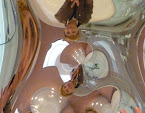It was the mid-fifties - I suppose it could have been Fantasia or something by Charlie Chaplin, films I saw around the same time, but I’ve always remembered (or thought) that the first film I ever saw was Jedda, in Toowoomba, Queensland, with my parents and, probably, although I can’t recall them being there, my older sister and brother. The cinema (was it ‘The Empire’ or ‘The Strand’?) was packed and so our seats were in the front stalls, close to what seemed an absolutely gigantic picture screen to a seven year old child. I was mesmerised and, terrified. I don’t think the system of rating films deemed suitable to audience age had yet been considered in Australia. Perhaps I’ve remembered it as my ‘first film’ because it was such an overwhelming and powerful film and it was in full brand-new technicolour too.
Urban Cinefile explains the film : “Determined to tell a story that could be told only in Australia by Australians, Charles Chauvel made Jedda, the first Australian feature film to use Aboriginal actors in the lead roles and the first to be filmed in colour.
Set in the Northern Territory, it is the tragic story of a young Aboriginal girl of the Arrente tribe, adopted by a white woman, Sarah McCann, as a surrogate for her own baby who has died. She names the baby Jedda after a wild bird and raises her as a white child, isolating her from Aboriginal contact.

But when Marbuck, an Aboriginal man seeking work arrives on the station, Jedda is fascinated by him. Marbuck takes the half-willing teenage girl as his captive, returning to his tribal lands, only to find he is rejected by his tribe for breaking the marriage traditions.

The two are hounded from the tribe and chased by the men from Jedda's home station, until Marbuck is driven mad, and falls over a cliff to his death, together with Jedda.”

Some years ago, the dvd release of Jedda in 2004, prompted journalist Paul Kalina to reassess the film in an article in The Age Newspaper.
Earlier this week the Australian national public radio broadcast a
re-engagement with Jedda on the indigenous program AWAYE! with plenty of fascinating, insightful commentary about the making of the film and the thoughts, then and now, of the Aboriginal actors involved in the production and the prevailing societal attitudes to Aboriginal people around that time. Listening to the program, I remembered the powerful effect the film had on me as a very young girl, and I thought about how extraordinary change - tinged of course with a kind of informed and reflective plus ça change - can be, experientially, over half a century. Everything has changed - Jedda the film is almost a historical curiosity, but a formidable one.

No comments:
Post a Comment